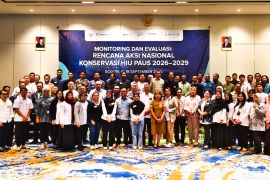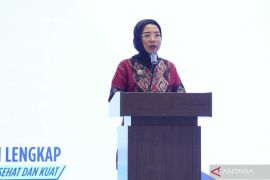In view of various inflationary pressures including the increasing prices of garlic and shallots until April the rate of inflation is projected to stand at 5.3 percent," BI Deputy Governor-elect Perry Warjiyo said.Pontianak, W Kalimantan (ANTARA News) - Bank Indonesia has not seen any strong reason to change or raise its reference rate now standing at 5.75 percent, deputy governor-elect Perry Warjiyo said.
"In view of various inflationary pressures including the increasing prices of garlic and shallots until April the rate of inflation is projected to stand at 5.3 percent," he said at a Focus Group Discussion at the West Kalimantan office of the central bank here on Friday.
He said this year`s inflation is predicted to be still within the targeted range of 4.5 percent plus or minus one percent.
He said global economic growth is projected to improve to affect the country`s export performance.
"The export performance will improve in line with improving global economy and the domestic demand will also increase due among other things to a general elections factor," he said.
Based on that, he said, economy is expected to grow between 6.3 and 6.8 percent provided stability is maintained.
Perry said the ratio of the current account deficit to the gross domestic product would also drop to make the balance of payment improving this year while the balance of capital and financial transactions would still record a big surplus.
Although Indonesia`s economic prospects are predicted to be better than global economic conditions, one of them commodity prices that still continued to decline, would still affect conditions, he said.
Perry said efforts were needed to strengthen national economic resilience by stabilizing macro-economic conditions and maintaining the monetary and financial system.
He said pressures affecting the sustainability of current account deficit and fiscal conditions due to increasing consumption of fuel oils in the midst of declining production must be reduced.
"Efforts are specially needed to reduce dependency on imports of raw materials and capital goods," he said.
He also said that efforts also had to be taken to deepen foreign exchange market penetration, increase efficiency and widen public access to banking services at an affordable price and to continuously improve inclusive economic growth.
Bank Indonesia, Perry said, in its policy aims to manage domestic demand so that it would be in line with efforts to keep the external balance.
"Bank Indonesia will continue strengthening the combination of policies through five pillars," he said.
The measures include maintaining the interest rate to be consistent with future inflation predictions to make it remain within the target.
The rupiah exchange rate policy meanwhile would be aimed at maintaining its movement to remain in line with the fundamental conditions.
Perry said macro-prudential policy meanwhile would be aimed at safeguarding the financial system stability and supporting the external and internal balance.
He said the policy would also be accompanied with other micro-prudential policies in the banking sector and the payment system.(*)
Editor: Heru Purwanto
Copyright © ANTARA 2013











